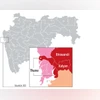A local apparel manufacturer notes a conspicuous absence in Prime Minister Narendra Modi’s usual salutations — “Modiji typically addresses his speeches to ‘mere pyare desh vasiyo’ and ‘yuva bharat’ (‘my dear citizens’ and ‘young India’) but it’s seldom that you hear ‘mere pyare vyapario’ (‘my dear traders’).” This omission, he suggests, is indicative of a broader need for the government to turn its attention to the city’s micro, small and medium enterprises (MSMEs).
With the 2024 Lok Sabha Elections entering the fifth phase on May 20, the spotlight is on Mumbai, and within it the Thane-Bhiwandi-Kalyan region. This political hotbed, home to a significant portion of Mumbai’s MSMEs, is witnessing an intense contest between so-called loyalists and rebels. In Thane, Rajan Vichare of the Shiv Sena (UBT) is taking on Naresh Mhaske of the Shiv Sena, while in Kalyan, Shrikant Shinde, son of CM Eknath Shinde, is battling against Vaishali Darekar of Shiv Sena (UBT). Bhiwandi will see an electoral fight between the BJP’s Kapil Patil, Union Panchayat Raj Minister, and Suresh Mahatre of the NCP (Sharad Pawar).
Maharashtra boasts nearly 4 million micro-enterprises, over 88,000 small enterprises, and around 10,000 medium enterprises. Around 41 per cent of these, according to media reports, are concentrated within Mumbai and Pune.
MSME exports from India shot up to $125.5 billion in 2023, a 42 per cent increase from $88.3 billion in 2021. Despite their contribution to the economy, with MSME exports from Maharashtra alone standing at $24.2 billion, many of these enterprises are on the verge of closure, relocation, or business model overhaul.
Mansukh Nishar, MD of Sangam Dresses and owner of Vitamins Kids — a clothing brand for children, recently surrendered his MSME licence following the government’s implementation of the payment clause under the MSME Development Act of 2006. He criticises the lack of government focus on SMEs and the absence of policies attracting SMEs to Maharashtra. “Unlike other states, Maharashtra has not come out with any policy that attracts MSMEs to set up shop here,” he tells Business Standard at his factory outlet in the Kalyan-Bhiwandi Industrial area.
An electronics manufacturer in Thane also fears his business’s closure due to rising real estate prices and lack of government support.
More From This Section
Thane
Thane, a hub for engineering and electronics firms, faces challenges with access to finance and obtaining licenses. “Under the Credit Guarantee fund Trust for Micro and Small Enterprises, MSMEs can get collateral-free loans up till Rs 5 crore for manufacturing business. But this is just on paper, banks have been hesitant in sanctioning these loans,” says Ninad Jaywant, honorary general secretary, the Chamber of Small Industry Association, which includes the Thane Small Scale Industries Association, which has about 2,500 members.
The process of securing permissions is another hurdle, with small businesses in non-industrial areas facing stringent rules. “Take the example of Bhiwandi. If you set up a factory in that area you will require permission from Fire Department. But there is no fire station in villages near Bhiwandi city. One has to depend on the fire station that are in Thane district, Kalyan or Bhiwandi city. The government has not created enough infrastructure for business but now they need permissions,” he says.
Ashish Patil, founder and CEO of Electroteknics, a manufacturer of electrical and electronics control panels and fabricator, shares these concerns, particularly the impact of the MSMED Act. “It took two years for us to recuperate from the Covid impact and now we have to deal with the MSMED Act.”
To ensure timely payments to MSMEs, a new regulation was implemented on April 1, which requires companies to settle their dues to MSMEs within 45 days. Non-compliance will lead to a tax liability on the overdue amount. Retailers have been objecting to this and MSMEs are fearing an impact on demand.
Kalyan-Bhiwandi
The Kalyan-Bhiwandi area, known for its manufacturing industries, such as plastics, garments and powerlooms, and emerging as a warehousing hub (1.5 million people are involved in warehousing alone), grapples with rising power tariffs, escalating property taxes, and inadequate infrastructure.
According to industry sources, Maharashtra has 16,000 garment factories, of those 10,000 are in Mumbai — mostly the Kalyan-Bhiwandi and Nalasopara regions.
A few years ago, the area housed over 800,000 powerlooms, a number which has now dwindled by 50 per cent because of rising power tariffs and high realty costs.
Underlining that “MSMEs are the largest employer after agriculture”, Rahul Mehta, chief mentor of the Clothing Manufacturers Association of India, suggests: “The PLI scheme for textiles could have been more successful had the minimum criterion for apparel been lower.”
The Bhumi Industrial Park, another example of delayed government intervention, is a private initiative spread over 150 acres and divided into three phases of development. At present, there are around 2,000 offices employing 55,000 people, mostly unskilled.
Despite initial entitlement for a 40 per cent government subsidy, a Bhumi executive said that units in the park did not receive this, and the scheme is now discontinued.
)